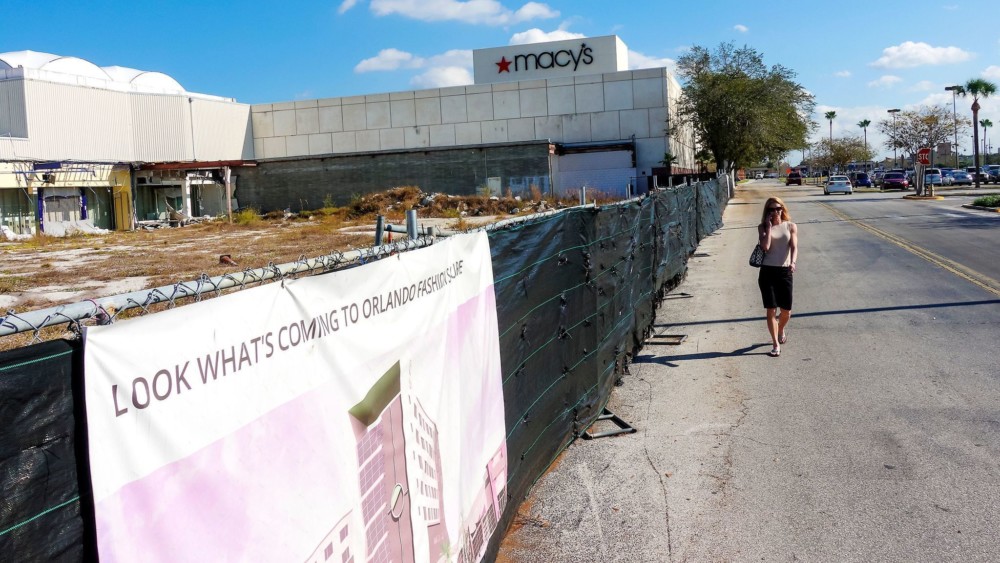By Kyle Arnold
Orlando Sentinel
WWR Article Summary (tl;dr) Retail analysts say brick-and-mortar is facing its biggest challenge since the Great Recession. But this time it’s not general economic woes, it’s online shopping and an over-saturation of physical stores causing the problems.
Orlando Sentinel
Gymboree was the latest victim of the “Retail Apocalypse” last week when it announced it would close three stores at Central Florida malls.
In case you think that’s an exaggeration, check out some numbers. At least 60 national chain stores have closed in Metro Orlando since the start of 2016, along with another 100 stores wiped out when Artegon Marketplace closed.
In Central Florida, retailers such as Macy’s, The Limited, hhgregg and locally owned Siegel’s Clothing Co. have closed local stores or shut down entirely. They join dozens of others, including Wet Seal, Payless ShoeSource and Radio Shack.
Brick-and-mortar is facing its biggest challenge since the Great Recession. But this time it’s not general economic woes, it’s online shopping and an over-saturation of physical stores causing the problems, analysts said.
“From everything you read you would think that retailers are dying out,” said Betsy Goodman, who heads the retailing program at the University of Florida. “The online business has had some impact, but it doesn’t account for all the closures we’ve seen. It’s the stores that aren’t adapting that are dying.”
And it will likely continue, she said, especially with some older retail chains.
Goodman will be part of a panel this week called “The Retail Apocalypse: Fake News,” hosted by the Central Florida NAOIP, a trade association for commercial real estate professionals. According the event’s organizers, the panel will discuss how malls and shopping centers are filling the gaps left by closed national chains.
She’s among those who think physical stores will have a long future, but she said there will be more closures in the months to come.
The struggles of brick-and-mortar retail will face new pressure in Central Florida in the coming months after Amazon announced plans last week to build an 855,000-square-foot warehouse south of Orlando International Airport.
Destination malls have been among the hardest hit, including a recent bankruptcy and foreclosure for the former owner of Orlando Fashion Square, the closing of anchor department store Macy’s at Oviedo Mall and the demise of Artegon.
“The desire is gone to go to the local mall, like we used to in the ’80s and ’90s,” Goodman said.
John White found out how hard it is to survive as a retailer without online sales when he closed his BallBall Yoga store in Altamonte Springs in early July.
“You need to be online, and we didn’t have the presence there that I had hoped we would,” said White, who hosted yoga classes at his retail shop. “Trying to be just brick-and-mortar without the extra revenue that comes from online, that would be difficult.”
Competition for yoga merchandise also includes national retailers such as Lululemon and Athleta, Gap’s line of athletic apparel for women.
White said his plan is to move sales completely online and become a hub for yoga-mat information and reviews.
Another store might be in the future, but not without online propping it up, he said.
About 8.5 percent of all retail sales happened online in 2016, according to data from the U.S. Census Bureau, about double the sales of five years ago.
Retail analyst Suzanne Mulvee of Costar said online shopping isn’t the entire problem.
Stores were overbuilt over the past few decades, she said, and as much as 1 billion square feet of retail space in the United States needs to go away.
“The path back to a healthy market is to reduce the amount of competitive space operating in the market,” Mulvee said.
In the past two decades, new shopping areas have been built in Central Florida with big-box retailers such as Dick’s Sporting Goods, Target, Marshall’s and Ross Dress For Less. Those stores didn’t replace mall department stores; they added to the total number of retailers in the area.
Orlando retail real estate broker Jorge Rodriguez said there are plenty of examples of retail projects that are thriving.
“I don’t think you can replace a grocery store anytime soon,” he said. “Maybe my kids’ generation will though.”
There are other thriving retail districts too, such as Winter Park’s Park Avenue, Florida Mall, Mall at Millenia and Disney Springs. All of those offer unique shopping experiences and not just chain stores, he said.
“People are looking for experience,” he said. “You’ve got to give them something they can’t get anywhere else.”
Thearon Scurlock was the general manager during the early months of the failed Artegon Marketplace experience and now is the general manager at Kissimmee’s Old Town. Artegon closed in February.
“Shoppers want something to feel and touch still, but they also want to support their local retailers,” he said.
Old Town is a hybrid amusement park and shopping center. He said they don’t have any chain retailers.
“We can’t have anything cookie-cutter,” he said. “I don’t want to go to a bunch of cookie-cutter stores and get the same thing I can already get online.”














































































































































































































































































































































































